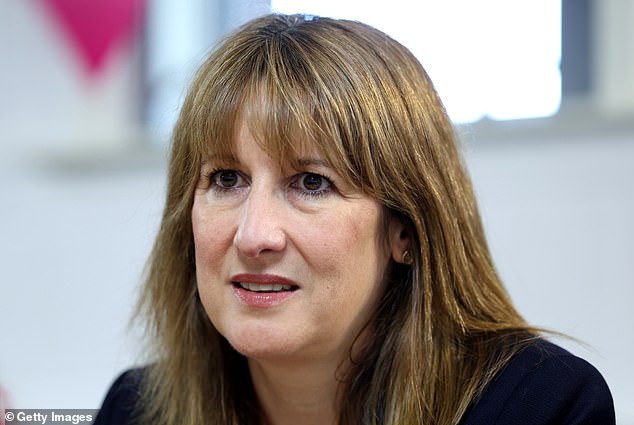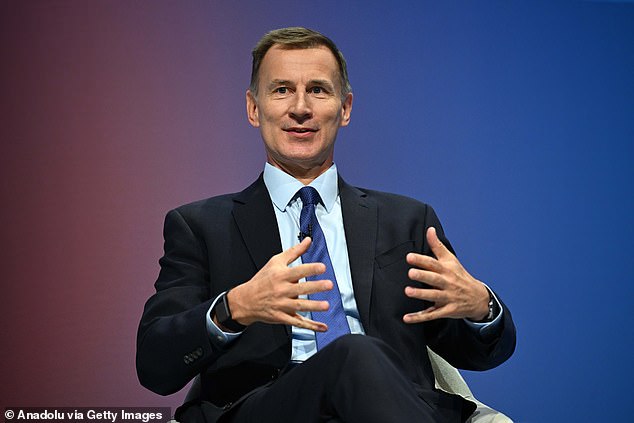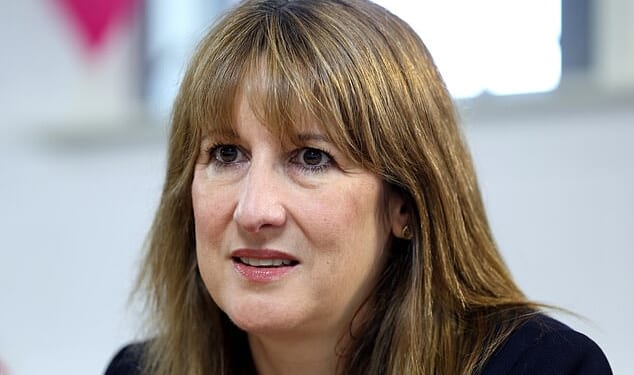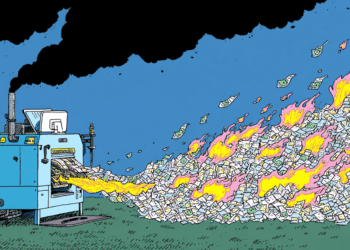It is now just over eight weeks until the Budget. Already we are being ‘softened up’ for tax rises which the Government wants us to believe are inevitable. Economists think they will be about £30billion – equivalent to 4p on income tax.
But scratch beneath the surface of our ever-expanding British State and you soon realise there is nothing inevitable about tax rises at all: they are a political choice.
A government without the courage to cut wasteful public spending is doomed to put up taxes in a way that risks killing off economic growth.
Some will say that is a bit rich coming from a former Chancellor who himself put up taxes. And it’s perfectly true that after spending about £350billion to support families and businesses during the pandemic, there was a reckoning.
But for Rishi Sunak and I, tax rises were always meant to be temporary. Time after time we argued that as soon as we could afford to, we would bring them back down. When we introduced full expensing for business and cut 4p off employees’ National Insurance Contributions, we put our money where our mouth was.
And for a very good reason. Evidence from all over the world shows that lower tax means higher growth. Between 2010 and 2019, OECD countries with the lowest levels of public spending – such as Australia, the US and South Korea – grew on average nearly 2 per cent faster per annum than countries with higher levels, such as the UK, France and Germany.
That is for two reasons. Firstly, because higher levels of tax reduce investment by businesses – and without investment, there is no growth. But, secondly, because capitalism needs what John Maynard Keynes called ‘animal spirits’.
A culture of personal responsibility and reward for hard work encourages people to take risks and start businesses – as I did at the age of 24. When the State takes less in tax, people work more, leading to a more dynamic economy. Between 2010 and 2019, people living in advanced economies with lower taxes worked five hours more every week.

Economists predict Rachel Reeves will announce tax rises of £30billion – equivalent to 4p on income tax
But if you keep putting up taxes – as this Government looks set to do in every single Budget over the Parliament – you push the country into a doom loop of ever-higher taxes and ever-lower growth. So what’s the solution?
I am not someone who wants to strip public services to the bone. As the longest-serving health secretary, I am proud to live in a country where everyone – rich or poor – is entitled to receive high-quality care from the NHS. And with an ageing population, over time it will need more resources. At the same time we have a dangerous aggressor in Moscow. For the first time since the 1980s we can no longer take our security and democratic way of life for granted.
So why do I say raising tax is a choice, not an inevitability? Because when the British State spends more than £1trillion a year, there are plenty of things the Chancellor can do that remove the need for tax rises – and protect vital public services.
The first is to run them more efficiently. It is now painfully clear that the £9.4billion pay rise offered to public sector unions within weeks of Labour’s victory was a mistake.
We were told this was to settle strikes, but when you cave in to unreasonable demands you sow the seeds for more industrial action. We should pay public sector workers generously – but, just as in the private sector, there should be a simple rule: above-inflation pay rises need to be funded by productivity improvements.
Train drivers got a 15 per cent pay rise over three years – a £10,000 inflation-busting rise for some drivers. Yet their contracts are notoriously out of date, not least when it comes to driverless trains that are perfectly safe and indeed already operate in some parts of the country.
Putting that kind of money on the table would have been a perfect opportunity to get rid of the industry’s many Spanish practices. Instead, it came with no strings at all.
But what if, going forward, the Government did things differently? If we raise productivity growth in the public sector to a level closer to the 2 per cent long-term average in the private sector, public spending would grow more slowly. According to the Office for Budget Responsibility, that could save about £15billion after three years.

Jeremy Hunt served as Chancellor of the Exchequer from 2022 to 2024
Secondly, the Government could summon up the guts to tackle our ballooning welfare state. Just when we need more people in work to support an ageing population, the reverse is happening.
Nearly a quarter of our adult population is not in work. More than 1,000 people are being signed off having to look for work every single day. The Centre for Social Justice recently reported that next year the income of someone out of work claiming Universal Credit health, PIP and the local housing allowance will be £2,500 better off after tax than someone working full-time on the National Living Wage.
That costs taxpayers a fortune. But, more importantly, it is terrible for the individuals involved. The majority are signed off for anxiety or depression but is this kind of diagnosis or – over-diagnosis – wise?
Every doctor I spoke to as health secretary said that social contact is vital for tackling mental illness. Removing someone from meeting friends and colleagues at work does the opposite.
We should be treating people who are unwell, not parking them on welfare – which also helps the economy because it makes it easier for companies to find the workers they need.
It would help the Chancellor, too. If we reduced the cost of working age benefits to pre-Covid levels, we would save £47billion a year after five years.
We know from this summer’s welfare U-turn that doing so is politically challenging. But the Government went about it the wrong way.
If, alongside welfare reform, they improved mental health provision, any changes would have a much better chance. And staying stuck in a low-growth trap caused by ever-higher taxes is hardly going to help those Labour MPs keep their seats.
There is one more way we could stop tax increases – and it’s one we should talk about much more.
It’s time to be honest about our debt problem. Our national debt is now nearly 100 per cent of GDP, and the interest rates we pay are higher than any other G7 country.
The total interest bill now costs more than the budget for the police, schools or defence. The average household pays an astonishing £3,900 in tax every year to fund it.
Part of the reason we pay higher levels of interest is because markets are worried about higher inflation in the UK. But part of it is because they are not convinced we have a good plan to bring our debt down. Perhaps they are right. In the last Budget, the Chancellor chose to raise borrowing by a further £28billion a year.
Much of the debt has been caused by economic shocks: Covid; the energy crisis; and, before that, the global financial crisis. In 2010, the State was borrowing nearly a quarter of every penny it spent. To his credit, George Osborne set us on a path that reduced our deficit from 10 per cent of GDP to 2 per cent.
But we still continued borrowing. So now we should commit to a simple rule going forward: that over a Parliament, public spending will never grow faster than the economy. That way debt would really start to fall as a proportion of GDP, markets would regain confidence in our fiscal prudence, and the world would know that Britain will always live within our means.
None of this is easy. But without decisive change, we will remain stuck in a double spiral of ever-higher tax and ever-higher debt leading to ever-lower growth. It is the ‘grown-up’ government we were promised and desperately need. But is the Chancellor listening?












